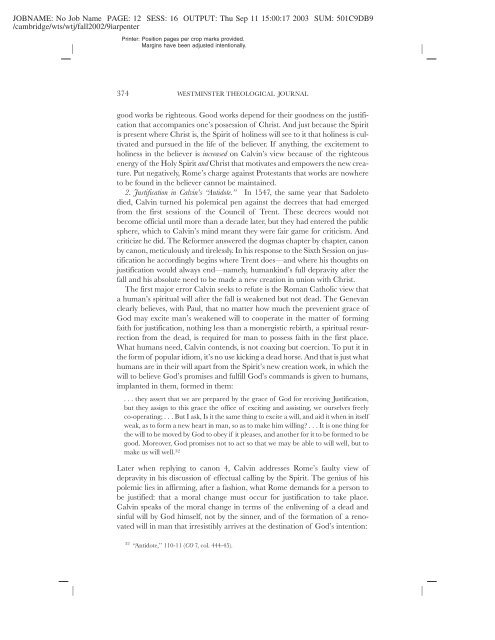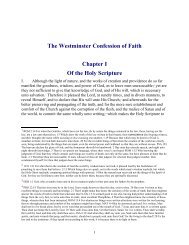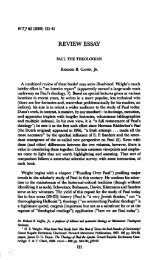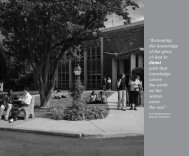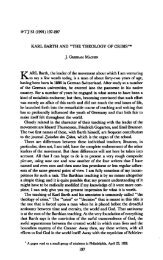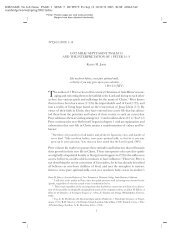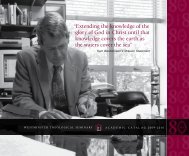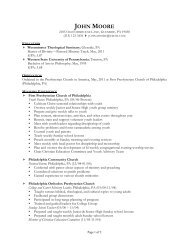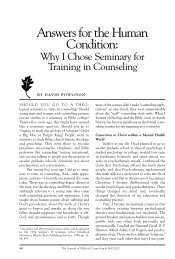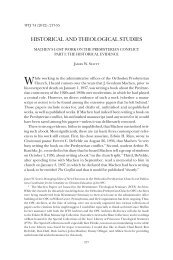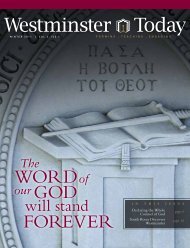A Question of Union with Christ? Calvin and Trent on Justification
A Question of Union with Christ? Calvin and Trent on Justification
A Question of Union with Christ? Calvin and Trent on Justification
You also want an ePaper? Increase the reach of your titles
YUMPU automatically turns print PDFs into web optimized ePapers that Google loves.
JOBNAME: No Job Name PAGE: 12 SESS: 16 OUTPUT: Thu Sep 11 15:00:17 2003 SUM: 501C9DB9<br />
/cambridge/wts/wtj/fall2002/9ìarpenter<br />
Printer: Positi<strong>on</strong> pages per crop marks provided.<br />
Margins have been adjusted intenti<strong>on</strong>ally.<br />
374 WESTMINSTER THEOLOGICAL JOURNAL<br />
good works be righteous. Good works depend for their goodness <strong>on</strong> the justificati<strong>on</strong><br />
that accompanies <strong>on</strong>e’s possessi<strong>on</strong> <str<strong>on</strong>g>of</str<strong>on</strong>g> <str<strong>on</strong>g>Christ</str<strong>on</strong>g>. And just because the Spirit<br />
is present where <str<strong>on</strong>g>Christ</str<strong>on</strong>g> is, the Spirit <str<strong>on</strong>g>of</str<strong>on</strong>g> holiness will see to it that holiness is cultivated<br />
<str<strong>on</strong>g>and</str<strong>on</strong>g> pursued in the life <str<strong>on</strong>g>of</str<strong>on</strong>g> the believer. If anything, the excitement to<br />
holiness in the believer is increased <strong>on</strong> <str<strong>on</strong>g>Calvin</str<strong>on</strong>g>’s view because <str<strong>on</strong>g>of</str<strong>on</strong>g> the righteous<br />
energy <str<strong>on</strong>g>of</str<strong>on</strong>g> the Holy Spirit <str<strong>on</strong>g>and</str<strong>on</strong>g> <str<strong>on</strong>g>Christ</str<strong>on</strong>g> that motivates <str<strong>on</strong>g>and</str<strong>on</strong>g> empowers the new creature.<br />
Put negatively, Rome’s charge against Protestants that works are nowhere<br />
to be found in the believer cannot be maintained.<br />
2. Justificati<strong>on</strong> in <str<strong>on</strong>g>Calvin</str<strong>on</strong>g>’s ‘‘Antidote.’’ In 1547, the same year that Sadoleto<br />
died, <str<strong>on</strong>g>Calvin</str<strong>on</strong>g> turned his polemical pen against the decrees that had emerged<br />
from the first sessi<strong>on</strong>s <str<strong>on</strong>g>of</str<strong>on</strong>g> the Council <str<strong>on</strong>g>of</str<strong>on</strong>g> <str<strong>on</strong>g>Trent</str<strong>on</strong>g>. These decrees would not<br />
become <str<strong>on</strong>g>of</str<strong>on</strong>g>ficial until more than a decade later, but they had entered the public<br />
sphere, which to <str<strong>on</strong>g>Calvin</str<strong>on</strong>g>’s mind meant they were fair game for criticism. And<br />
criticize he did. The Reformer answered the dogmas chapter by chapter, can<strong>on</strong><br />
by can<strong>on</strong>, meticulously <str<strong>on</strong>g>and</str<strong>on</strong>g> tirelessly. In his resp<strong>on</strong>se to the Sixth Sessi<strong>on</strong> <strong>on</strong> justificati<strong>on</strong><br />
he accordingly begins where <str<strong>on</strong>g>Trent</str<strong>on</strong>g> does—<str<strong>on</strong>g>and</str<strong>on</strong>g> where his thoughts <strong>on</strong><br />
justificati<strong>on</strong> would always end—namely, humankind’s full depravity after the<br />
fall <str<strong>on</strong>g>and</str<strong>on</strong>g> his absolute need to be made a new creati<strong>on</strong> in uni<strong>on</strong> <str<strong>on</strong>g>with</str<strong>on</strong>g> <str<strong>on</strong>g>Christ</str<strong>on</strong>g>.<br />
The first major error <str<strong>on</strong>g>Calvin</str<strong>on</strong>g> seeks to refute is the Roman Catholic view that<br />
a human’s spiritual will after the fall is weakened but not dead. The Genevan<br />
clearly believes, <str<strong>on</strong>g>with</str<strong>on</strong>g> Paul, that no matter how much the prevenient grace <str<strong>on</strong>g>of</str<strong>on</strong>g><br />
God may excite man’s weakened will to cooperate in the matter <str<strong>on</strong>g>of</str<strong>on</strong>g> forming<br />
faith for justificati<strong>on</strong>, nothing less than a m<strong>on</strong>ergistic rebirth, a spiritual resurrecti<strong>on</strong><br />
from the dead, is required for man to possess faith in the first place.<br />
What humans need, <str<strong>on</strong>g>Calvin</str<strong>on</strong>g> c<strong>on</strong>tends, is not coaxing but coerci<strong>on</strong>. To put it in<br />
the form <str<strong>on</strong>g>of</str<strong>on</strong>g> popular idiom, it’s no use kicking a dead horse. And that is just what<br />
humans are in their will apart from the Spirit’s new creati<strong>on</strong> work, in which the<br />
will to believe God’s promises <str<strong>on</strong>g>and</str<strong>on</strong>g> fulfill God’s comm<str<strong>on</strong>g>and</str<strong>on</strong>g>s is given to humans,<br />
implanted in them, formed in them:<br />
. . . they assert that we are prepared by the grace <str<strong>on</strong>g>of</str<strong>on</strong>g> God for receiving Justificati<strong>on</strong>,<br />
but they assign to this grace the <str<strong>on</strong>g>of</str<strong>on</strong>g>fice <str<strong>on</strong>g>of</str<strong>on</strong>g> exciting <str<strong>on</strong>g>and</str<strong>on</strong>g> assisting, we ourselves freely<br />
co-operating; . . . But I ask, Is it the same thing to excite a will, <str<strong>on</strong>g>and</str<strong>on</strong>g> aid it when in itself<br />
weak, as to form a new heart in man, so as to make him willing . . . It is <strong>on</strong>e thing for<br />
the will to be moved by God to obey if it pleases, <str<strong>on</strong>g>and</str<strong>on</strong>g> another for it to be formed to be<br />
good. Moreover, God promises not to act so that we may be able to will well, but to<br />
make us will well. 32<br />
Later when replying to can<strong>on</strong> 4, <str<strong>on</strong>g>Calvin</str<strong>on</strong>g> addresses Rome’s faulty view <str<strong>on</strong>g>of</str<strong>on</strong>g><br />
depravity in his discussi<strong>on</strong> <str<strong>on</strong>g>of</str<strong>on</strong>g> effectual calling by the Spirit. The genius <str<strong>on</strong>g>of</str<strong>on</strong>g> his<br />
polemic lies in affirming, after a fashi<strong>on</strong>, what Rome dem<str<strong>on</strong>g>and</str<strong>on</strong>g>s for a pers<strong>on</strong> to<br />
be justified: that a moral change must occur for justificati<strong>on</strong> to take place.<br />
<str<strong>on</strong>g>Calvin</str<strong>on</strong>g> speaks <str<strong>on</strong>g>of</str<strong>on</strong>g> the moral change in terms <str<strong>on</strong>g>of</str<strong>on</strong>g> the enlivening <str<strong>on</strong>g>of</str<strong>on</strong>g> a dead <str<strong>on</strong>g>and</str<strong>on</strong>g><br />
sinful will by God himself, not by the sinner, <str<strong>on</strong>g>and</str<strong>on</strong>g> <str<strong>on</strong>g>of</str<strong>on</strong>g> the formati<strong>on</strong> <str<strong>on</strong>g>of</str<strong>on</strong>g> a renovated<br />
will in man that irresistibly arrives at the destinati<strong>on</strong> <str<strong>on</strong>g>of</str<strong>on</strong>g> God’s intenti<strong>on</strong>:<br />
32 ‘‘Antidote,’’ 110-11 (CO 7, col. 444-45).


